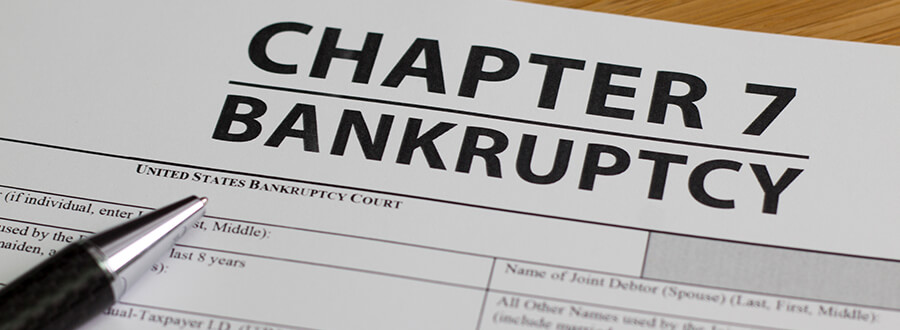Key Points
- You must qualify for Chapter 7, which requires a means test that calculates the ratios of your income to expenses and is adjusted by state.
- Not all debts qualify for a discharge under a Chapter 7 Bankruptcy.
- To qualify for the maximum amount of debt relief, you must be truthful about your income and expenses and include everything requested in your bankruptcy petition.

Filing for Chapter 7 bankruptcy could give you a fresh start. In most cases, those who qualify have few assets to sell and can receive a discharge of most unsecured debts. The bankruptcy will eliminate your legal obligation to repay creditors and prevent companies from pursuing you for the repayment of your debts.
While the goal of Chapter 7 is to relieve your debt burdens, the system is fraught with complexities and a detailed process. If you have particular circumstances or fail to follow the procedures with exactness, you may find your Chapter 7 bankruptcy petition denied.
Below are 10 reasons you may be denied if you try to file for Chapter 7 bankruptcy.
- You can make monthly payments to satisfy at least some of the debt owed. The first step to qualifying for Chapter 7 is to prove you are unable to repay the debt by passing a “means test.” If your income is too high or the obligations too low, the judge can convert the petition to Chapter 13 and require you to repay some of your debts under court supervision.
- You own non-exempt assets. When you file for bankruptcy, you are required to present a list of all assets and debts. The bankruptcy trustee subtracts exempt assets to determine if you have any possessions available for debt repayment. For example, if you own a vehicle worth $30,000 and carry a $10,000 loan balance on that vehicle, the court trustee could force you to sell the car and use the $20,000 of equity to repay your creditors.
- You previously filed for bankruptcy. If you previously filed for Chapter 7 bankruptcy, the law requires you wait eight years before filing again. If you previously filed for Chapter 13 bankruptcy, the law requires requires a six-year gap between filings.
- You commit fraud against either creditors or the bankruptcy court. The courts have a broad view of fraud. Obtaining debt for recently purchased luxury items, not listing assets on the bankruptcy schedules, and destroying or falsifying documents are a few examples of bankruptcy fraud.
- You made disqualifying asset transfers. There is a look back period that is established for the transfer of assets. The bankruptcy trustee could see a recent asset transfer as attempted fraud and invalidate your petition. Title transfers, such as giving a vehicle to your child, are easy to uncover.
- You have debts that don’t qualify for a discharge. Non-dischargeable obligations will not lead to the denial of your bankruptcy petition. However, it will prevent you from eliminating all debts through bankruptcy. There are 19 categories of debts that do not qualify for a discharge, such as student loan debt and marital obligations like alimony and child support.
- If you are judgment proof. Creditors offering unsecured debt have limited means of collection. The primary method is through legal action, which gives creditors the right to garnish wages or attach a lien on property. Consumers without titled assets or those with income a creditor cannot garnish like Social Security income are considered judgment proof. Meaning, even if a creditor sued, they would be unable to collect on the debt. In this case, there is less value in filing for bankruptcy.
- If you have the right amount of debt. Low debt limits minimize the benefit of filing bankruptcy due to the cost. Bankruptcy filing fees and attorney costs can add up to $2,000 or more. Chapter 7 does not set limits to qualify for bankruptcy, although Chapter 13 limits unsecured debts to $360,475.
- If you failed to complete all actions required under the bankruptcy. When you file bankruptcy, you must complete specific tasks and file paperwork under a strict schedule. Failure to submit the appropriate papers on time could result in a dismissal.
- If you do not complete the court ordered financial education requirement. Filing for bankruptcy includes an educational component. You must complete a certified bankruptcy course at the beginning and before the discharge to qualify for debt relief. Failing to complete this coursework could result in the dismissal of your petition.
Qualifying to file for a Chapter 7 bankruptcy is not a guaranteed outcome. Even one of the 10 reasons above can cause your petition to be denied, or require you to convert your petition to a Chapter 13 bankruptcy which requires you to pay back a portion of your debt to creditors similar to what is required in a debt settlement program. However, Debt Settlement, unlike Bankruptcy, does not carry the long-term stain that negatively impacts your credit score for up to 10 years, and the lifelong requirement to answer truthfully about filing for bankruptcy in the past. Doing so can result in negative outcomes on job applications, leases applications and applications for new utility services.
Given these burdens you must carry as a result of a Chapter 7 or Chapter 13 bankruptcy, it may be worth the time to investigate how a debt settlement program can get your out of debt sooner and on your way to recovering your credit score faster; and prevent you from having to carry the burden of filing bankruptcy with you for the rest of your life.
